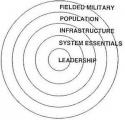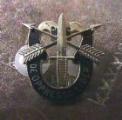Q: "Our guys read the newspapers. They resent being sent over here to die for nothing." More than anything else, Vietnam was the first really televised war. Are citizens able to appreciate why a war might be just? Or will they simply oppose all war, because war (like life) has many horrible aspects? When they do oppose wars, will they forever alienate soldiers as they did your fellow soldiers?
A: I think citizens can appreciate why a war might be just so long as the cause is sharp and stark. Pearl Harbor. The World Trade towers. Where the need for war is difficult to comprehend is when the war arrives due to reasons two or three times removed from direct effect on the country. We went to Vietnam because it was a proxy for our otherwise "cold" war with the Soviets and China. The rationale was hard to sustain as time went on and on with little consistent progress. Finally, someone realized that the South Vietnamese were never going to stand on their own, so we said, "enough already."
We went to Afghanistan as a result of 9/11. There has been little or no complaint about that. We went to Iraq under more dubious circumstances and there has been more and more complaint as the war has gone on and on. Americans see little if any affect of such a war on themselves or their aspirations, so most are now saying, enough already. I believe any war not the result of sharp and certain evidence of national harm will eventually, perhaps shortly, see opposition. That sharp and certain evidence of national harm might have to be an actual attack like Pearl Harbor or 9/11 before opposition will be quieted, especially for a long, enduring war.
I think those who oppose a particular war will always to some degree alienate the soldiers fighting it, even if on the surface the soldier understands that opposition. War is a visceral, life-changing thing. It is hard to always understand that those who oppose the war do not oppose you and the goals you are striving for. On the other hand, I do not think most soldiers are forever alienated. At least there is not a through-and-through alienation. They come to understand, if they did not understand already, that opposition to the war was opposition to policy, not opposition to them. Most learn to adjust.
. I'm downloading it now...
!















Bookmarks